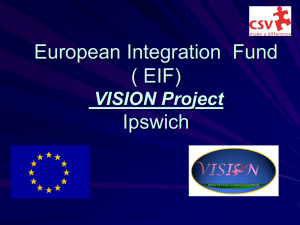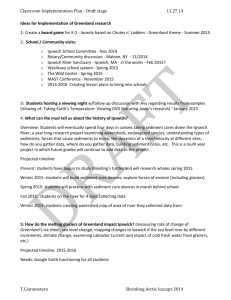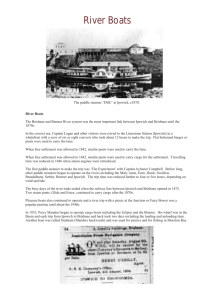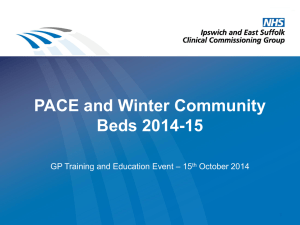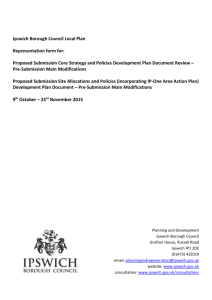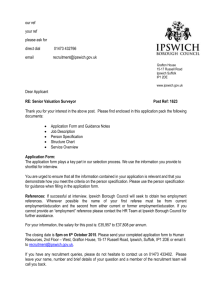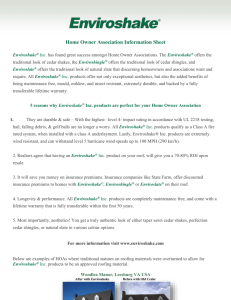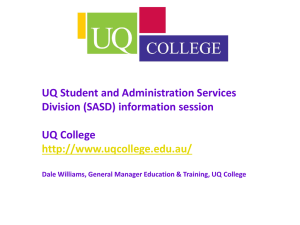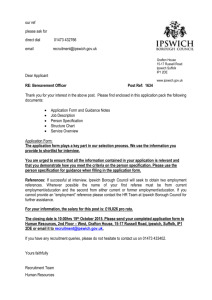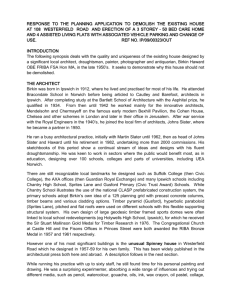Presentation - Queensland Council of Social Service
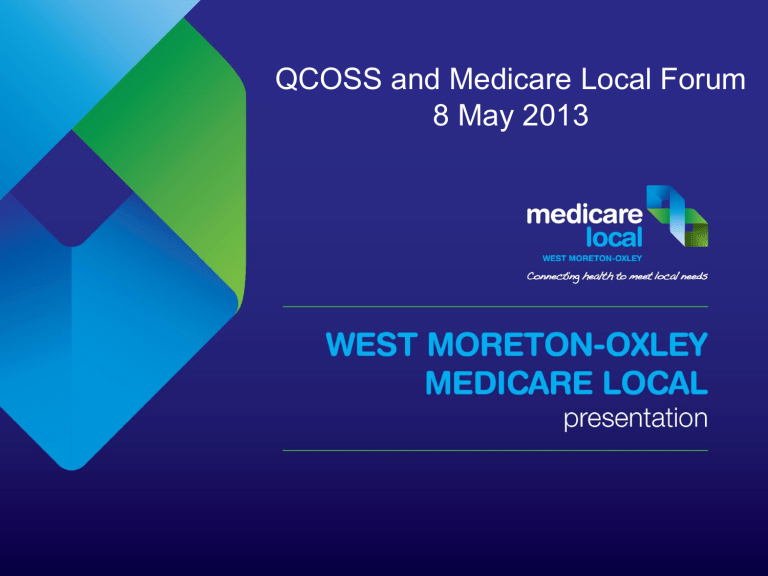
QCOSS and Medicare Local Forum
8 May 2013
West Moreton-Oxley Medicare Local Region
Total Area: 9,618km 2
Total population (2011): 365,638 (community of communities)
Suburbs : 197
Postcodes: 33 full & 10 partial
Number of Medical Practices: 110
Number of GPs: 409 (both p/t & f/t)
Hospitals (within WMOML):
Boonah Hospital (public)
Esk Hospital (public)
Gatton Hospital (public)
Ipswich General Hospital (public)
Laidley Hospital (public)
St Andrews Ipswich Private Hospital (private)
Mix of rural and high density living – aged persons in rural areas; young families in urban areas;
Rapid growth in population - 52% in next 15 yrs
High prevalence of chronic disease – asthma, diabetes, circulatory system diseases
Health risk factors – obesity, smoking, harmful use of alcohol)
Regional Communities Transport Solutions Initiative
Background
• WMOML Community Advisory
Group research identified the need for a regional community transport solution as a priority goal for 2012 – 2013
• Transport consistently raised as a concern by rural and regional communities and service providers impacting on access to primary health care, community support services, employment, education, social, sporting and recreational pursuits
Regional Communities Transport Solutions Initiative
Background
• Key stakeholders confirmed the need for leadership to develop an appropriate, coordinated transport response and recognized that local responses were not meeting demand a ‘whole of region’ approach was required
• Independent research confirmed best practice service delivery to be: community driven; evidence based; technology and resource efficient; sustainable; accessible and integrated
Regional Communities Transport Solutions Initiative
Goal
To coordinate the implementation of an accessible, affordable, reliable and sustainable region wide transport service for disadvantaged members of the community within the Ipswich,
Somerset, Lockyer Valley and
Scenic Rim regions
Regional Communities Transport Solutions Initiative
Partnership Arrangements
• WMOML – Project Leader and Funds Manager
• Community Advisory Group – Steering Group
• Project Management Group – WMOML, Ipswich City Council,
Mission Australia
•
Project Partners
– West Moreton Hospital and Health Service;
Lockyer Valley RC, Somerset RC; DEEWR; Ipswich Hospital
Foundation; Regional Development Australia
Timeline of Activity and Events –
Identification of issues & stakeholder engagement
WMOML CAG identify
Community Transport as a Key Priority for
2012 – 2013
Minister Plibersek and
Councillor Neumann briefed by VIP
Transport re concerns in Somerset region
Ipswich City Council meet with WMOML re Community
Engagement – Community
Transport is discussed
“ Transport – Everyone’s
Concern, No-ones Business” workshop 1 held
Workshop 2 held in Ipswich with key partners. Call to action endorsed.
DEEWR express interest in collaboration for a transport solution in Logan and Ipswich regions
CEO WMOML seeks financial commitment and in kind contribution from Project
Partners
Aug 2012 Sept 2012 Oct 2012 Nov 2012 Dec 2012
WMOML draft Regional
Transport plan developed
Mission Australia commits funds to support scoping study
WMOML commits funds for scoping study in partnership with ICC and
Mission Australia
ConNetica consulting presents proposal for Inala, Goodna &
Ipswich corridor
Progress report presented to
WMOML CAG
Timeline of Activity and Events
Project planning and implementation
Decision to expand scope to include whole of region. 4 phased approach endorsed.
Project Management team established.
Workshop 3 rescheduled due to regional flood recovery responses
Consumer online surveys developed and reviewed
Progress report to WMOML CAG
Meeting with DEEWR to discuss transport initiatives
Workshop on Wheels Workshop – visit to Comlink Mobility
Mangement Service, Sunshine
Coast
Jan 2013 Feb 2013 March 2013 April 2013
Ongoing independent research conducted
Briefing note and progress report sent to Project Partners
DEEWR contributes $20,000 towards
WMOL/Logan scoping study
Workshop on Wheels rescheduled due to regional flooding
Progress report to WMOML CAG
Consumer surveys distributed to networks
Transport Provider Survey developed and endorsed
Briefing to CEO WMOML and Shayne
Neumann, Federal Member for Blair
RCTSI Management Team Planning
Meeting
Regional Communities Transport Solutions Initiative
Key Learnings
• Community transport solutions need to take account of different needs, priorities and aspirations
• Need for a whole of community approach to improving access
• Need to build on existing knowledge and services , grass roots intelligence and lessons learnt rather than commission new research and new services
• Need for greater coordination and collaboration between existing providers – inefficient use of available infrastructure and resources
• Need to introduce a community transport solution which does not compete with, but rather facilitates access to , existing transport providers
• Providing transport to health and community services does not replace the need to increase the presence of these services in rural communities
Regional Communities Transport Solutions Initiative
Key Learnings
• A regional solution will demand collaboration between all stakeholders, across regional council boundaries and a long term investment of finances, human resources, IT and in kind contribution
• A centralised, coordinated point of contact is likely to deliver the best outcome for the region
• Need to overcome regulatory, insurance and policy barriers
• Community transport responses need to be supported by a well managed and well resourced volunteer base
• Any transport solutions need to be efficient and accountable with strong governance and effective management
Regional Communities Transport Solutions Initiative
Challenges
• Maintaining project momentum and the commitment of Project Partners
• Engaging diverse communities of interest
• Sourcing the funds required to commission a mobility transport management service to deliver the RCTSI within West Moreton-Oxley
• Ongoing project and funds management and coordination
• Monitoring and evaluation
• Sustaining a long term viable, cost effective service aligned to changing community need
Regional Communities Transport Solutions Initiative
Next Steps
• Consumer survey distribution – progress, barriers, data analysis
• Engaging with transport providers
• Conduct of focus groups
• Identifying point of contact with project partners
• Briefing to Lockyer Valley and Scenic Rim
• Development of a business and funding model
